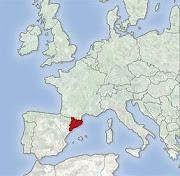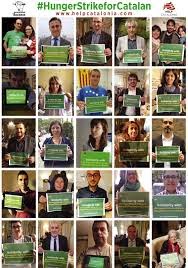Bouquets of red roses adorning flower stands at the Placa de Catalunya have transformed Barcelona's downtown into a dark red sea. In Catalonia, it's customary to exchange red roses and books on April 23.
But by now, those roses have become synonymous with certain political convictions. Bouquet wrappings are imprinted with the Catalonian flag - some even with a star, standing for the demand for independence.
At his Barcelona flower stand selling such bouquets, Roger Fernandez proclaimed that Catalonians should be allowed to vote on independence from Spain November 9 this year. He added a warning: "People have high expectations, but I don't really believe that there will be significant changes. After all, we know how the economic system works."

Roses not in the colors of Catalonia's flag don't sell well
Unconstitutional referendum
What is certainly doubtful is whether or not such a referendum will actually take place. Spain's constitutional court has already declared that a referendum on Catalonian independence would be unconstitutional. Although the constitution grants a degree of autonomy to Spain's various regions, it also spells out Spain's indivisibility. All its citizens are Spaniards - not just some.
The Spanish parliament
rejected a referendum on Catalonian independence at the beginning of this month. That, however, failed to dissuade Catalonia's head of government, Artur Mas, from carrying out his plan to hold the referendum on November 9. He said that should Spanish law rule out such an endeavor, he would ask the regional Catalonian parliament to legitimize it.
'Good for Catalonia and good for Spain'
Mas emphasized that although such a referendum would not be legally binding, he would try to negotiate with Spain, should a large majority speak out in favor of secession. If that were the case, Mas said, the European Union should also try to negotiate a solution that is "good for Catalonia, good for Spain, and also good for Europe."
In order to confer more weight to his endeavor,on World Book Day Mas invited international media representatives to his government palace downtown Barcelona - a move that was interpreted by the Spanish media as an attempt to internationalize the conflict.
Most EU states, however, consider the conflict an internal Spanish issue, and tell the Catalonians to take their problems to the Spanish government. Members of the European Commission have reiterated that an independent Catalonia would not automatically become a member of the European Union, as the acceptance of any new member state must be agreed upon unanimously by all member states - including Spain.
Third proposal

Artur Mas considers Catalonian independence not only a Spanish issue
None of the parties has officially rejected dialogue. However, the head of the Spanish government, Mariano Rajoy, has called on Mas to give up the referendum before negotiations can take place, in respect of his country's constitution.
The Catalonian leader retorted that he only wants to negotiate with Madrid regarding the referendum, arguing that 80 percent of representatives in the Catalonian parliament voted in favor of it.
But not all Catalonians are adhering to a nationalistic course. The Catalonian socialists, for example, demand a constitutional amendment that would transform the Spain from its present 17 "autonomous communities" into a true federal state.
The autonomous communities currently negotiate bilaterally with Madrid on their rights and responsibilities, including on financial matters. A federal state, like that of Germany, would replace the Catalonian parliament with a regional chamber. This proposal, however, appears rather complicated when compared with the more simplistic approaches of either Madrid or Barcelona.
Who cares?
While Artur Mas tried to turn World Book Day into a platform for his secessionist cause, authors were rather trying to sell their books on every street corner. Among them is Catalonian philosophy professor Manuel Cruz, whose latest work critically examines the internally-oriented Catalonian society.

Catalonians are intent on navel-gazing, author Author Cruz thinks
For quite some time now, Cruz explained, the main issue dominating public debate in Catalonia is the question of independence. "And people seem to be convinced that the entire world must be interested in our cause - navel-gazing on a grand scale," Cruz declared.
Cruz recalled that Artur Mas sent letters to all European governments - and got almost no response at all. "But when you watch regional television programs, you get the impression that the entire world is looking to what's happening here," he said. "We tend to view ourselves contentedly, immune to any kind of criticism," the philosopher noted.
Flower vender Merche is another who refuses to join the secessionist movement. Last year, she didn't sell flowers in wrappers adorned with the star of independence. "I am not in favor of independence," she said - even if that means less business. In the old days, she recounted, she used to sell at least 500 roses on the World Book Day - but nowadays, it's not even 100.





































